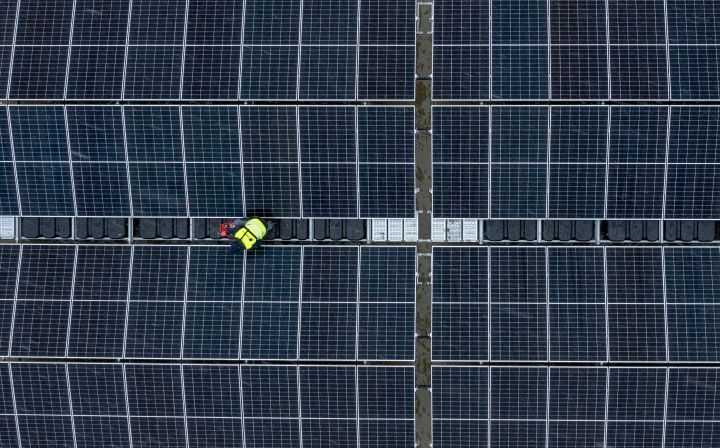
The forecast for the U.S. solar industry? Partly cloudy.

Even with energy prices surging, skies are not so sunny for the U.S. solar industry. The Department of Commerce is investigating whether solar panels imported from Southeast Asia are really coming from China, and therefore should be subject to tariffs. Solar trade groups say it’s causing projects to get postponed.
The Department of Commerce launched the investigation in April because of a complaint from Auxin Solar, a California solar panel manufacturer.
“The case is existential for us. Cheap panels coming from Southeast Asia just doesn’t allow us to compete,” said Mamun Rashid, CEO of Auxin Solar.
Rashid thinks his competitors in Vietnam and neighboring countries are basically Chinese subsidiaries using Chinese inputs.
If that’s the case, those panels should be hit with a tax that dates to the Obama administration.
After 2012 Chinese solar exports dropped considerably, while exports from Southeast Asia soared.
“It’s very interesting how quickly the Southeast Asian countries scaled production in such short order,” Rashid said.
Trade groups representing some of the solar markets’ major players said the allegation is baseless. But just the prospect of retroactive tariffs on imported solar panels is creating unprecedented uncertainty.
“It makes it impossible for investors to step up and finance new solar projects, for developers to build those projects. And the supply of solar components is rapidly dried up,” said Greg Wetstone, who heads the American Council on Renewable Energy.
The retroactive duties could end up adding up to 250% to the price of each solar panel, though that estimate is on the higher side.
Wetstone said the U.S. should be bulking up domestic solar manufacturing, especially in light of supply chain issues laid bare by the pandemic.
“But the way to do it isn’t to blow up the existing economy,” he said.
Mary Lovely at the Peterson Institute for International Economics said the investigation has highlighted an uncomfortable tradeoff.
“I think we have seen there is a tension between the Biden administration’s environmental goals and it’s goals with regard to moving supply chains out of China,” she said.
The Department of Commerce will announce its preliminary findings by Aug. 30.
There’s a lot happening in the world. Through it all, Marketplace is here for you.
You rely on Marketplace to break down the world’s events and tell you how it affects you in a fact-based, approachable way. We rely on your financial support to keep making that possible.
Your donation today powers the independent journalism that you rely on. For just $5/month, you can help sustain Marketplace so we can keep reporting on the things that matter to you.

















